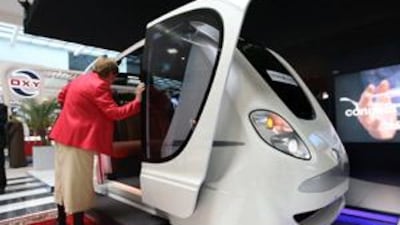It's the City of Lights, the City of Love. But more recently Paris has become synonymous with some of the worst traffic congestion in Europe. The city's mayor, Bertrand Delanoe, hopes to change that with an initiative called Autolib, which will add 4,000 electric vehicles to the streets in a car-sharing programme similar to that which the city already has with bicycles. "This could revolutionise transport," he said on a local radio station.
Cities have toyed with the idea of car-sharing programmes in the past, especially places where high traffic volume has led to poor air quality and diminished its citizens' health and quality of life. If there are relatively inexpensive rates for cars - not even necessarily electric - available on a short-term basis, the convenience could potentially dissuade a significant number of drivers from buying one of their own. This would reduce cars on the roads and carbon dioxide emissions, the thinking goes.
But in spite of the lauded five-day trial of the electric car share programme that took place last week, a segment of French society has reacted in anger, denouncing the mayor for his plan and saying it is not enough. Of course, these voices of dissent come from the ranks of the Green Party, whose members have gone on record as saying that any action that encourages private vehicles over other types of transportation is bad.
Perhaps it would be beneficial for the French to compare Delanoe's latest attempt at improving quality of life against other cities'. Dubai, for example, became the first city in the Gulf to license electric cars in November 2008. The number of cars that have been licensed since then? Zero, according to Peyman Younes, a spokesman for the RTA. The city's taxi fleet includes 20 hybrid vehicles - a test, he calls it, which, if successful, will lead to more hybrids.
In its perpetual fight to become greener without having to change its lifestyle, Canada's largest city has been mulling over a plan for a typically Canadian length of time. If it materialises (no guarantee), a fleet of 300 electric cars would be introduced on Toronto roads by 2012. The fight over who is responsible for what - as much a part of Canadian identity as hockey and maple syrup - plays into this issue as well, bien sur.
Ben Marans, the manager of grants and special projects at the Toronto Atmospheric Fund, told The Toronto Star recently that the electric car campaign had morphed into a classic chicken-and-egg problem, where neither those manufacturing the cars nor those who would construct infrastructure wants to make the first move. "People don't want to buy them if there's no recharging infrastructure and manufacturers won't make them until there's demand."
Well, at least no one is waiting for the Canadians to lead by example. The French actually might; Delanoe has just pushed the Paris programme's launch forward to sometime before the end of this year. Autolib will introduce 2,000 electric cars to the city and another 2,000 to the suburbs; they will be serviceable at 700 stations in the city and 700 outside. Reservations for use won't be required, only a valid credit card and driver's licence. The cars will cost about $5-$10 (Dh18-37) for every 30 minutes and an additional monthly fee of $22-$29 (Dh80-106). Though the numbers aren't conclusive, the supporting infrastructure should cost around $14 million (Dh51m).
Authorities estimate that if this system becomes popular, the city could reduce its carbon dioxide emissions by about 22,000 tonnes a year. Like all things environmental, there are inconveniences. A fully charged electric car can go about 160 kilometres before running out of juice, and batteries take about seven hours to recharge. Additionally, no car manufacturer mass produces electric vehicles. Nissan says it will have an all-electric model by 2010; Renault says it will by 2011.
Americans, however uninterested in considering similar programmes, are kicking themselves for not being the ones to manufacture such a vehicle, "if for no other reason than to cater to the niche markets like this French effort", one said in response to an ABC story on Autolib. "Tesla should have been ready and waiting to fill an order for Paris."

